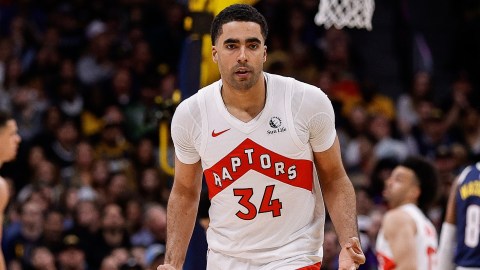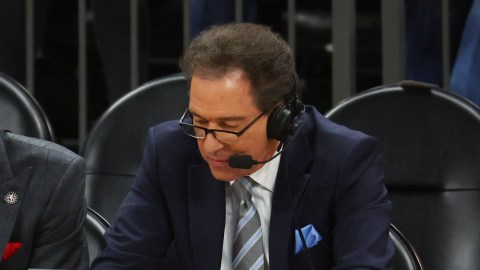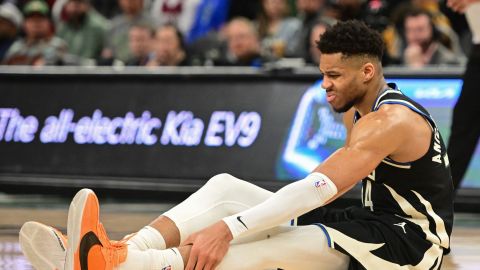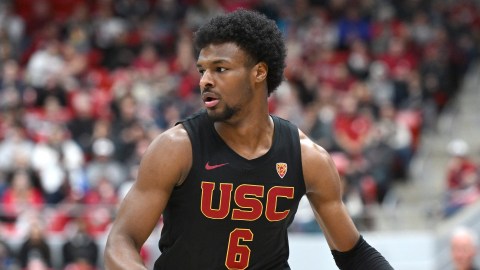It’s not an award for the league’s best player.
It’s not an award for the best player on the league’s best team, or the player who is the most indispensable to his team.
It’s not a career achievement award, an award for statistics, or an award for improvement.
In truth, regardless of what sport it is, nobody knows what the MVP award actually means.
For some reason, the same name — Derrick Rose — has been brought up in just about everyone’s MVP talks this NBA season. But why?
To be fair, there are reasons for that conclusion. There’s not some sort of epidemic of irrational gut instincts, although there does seem to be somewhat of a bandwagon mentality at work.
The most obvious argument for the Rose MVP is that the Bulls have improved from 41 wins to a pace of 59.5 wins, vaulting them from eighth to first in the East in less than a year. Likewise, Rose has raised his level of play significantly from last year, so when you put two and two together, you assume that Rose is adding all of that “value.”
But is that really true? By that logic, Tyson Chandler must be an MVP candidate because both he and the Mavericks are better this year than last. That, of course, is an unfair exaggeration of a point, but it does point out some major flaws in the “parallel improvements” argument. Are the Bulls and Mavs better because of Rose and Chandler? Or vice versa? Do they just seem better because so much else on the team has changed? Even if their improvement has catalyzed their teams’ success, is improvement being mistaken for “value”?
Let’s take a look back at the 2010 Bulls: no Carlos Boozer, no Ronnie Brewer and no Kyle Korver.
Instead, John Salmons was the team’s third-leading scorer, Rose shared the backcourt with Kirk Hinrich, Brad Miller patrolled the paint and Flip Murray, Acie Law, Hakim Warrick and Tyrus Thomas saw significant time in and out of the revolving door that was the Chicago roster. Add it all up, and the team scored 97.5 points per game while allowing 99.1.
In 2011, the Bulls score 98.3 and allow 91.2, meaning that the difference is nearly entirely on the defensive end.
Sure, Rose may be a better defensive player this year than last, as his points allowed per 100 possessions has dropped from 109 to 102 this season, but that still makes him just the 10th-best defender on his own team, and just marginally better than Korver by that metric. Being such a quick point guard, you’d expect him to rank among the league’s leaders in steals, but at 1.1 per game, he isn’t even near the league’s top 20.
In fact, you’d be pressed to find a defensive category that Rose really stands out in, because he’s still simply not a particularly good defender.
He’s just on a good defensive team. Functionally replacing Hinrich with the defensive-minded Brewer in the rotation has paid major dividends, as has replacing Miller with the physically imposing Boozer. However, the biggest reason for the defensive improvement is that of coaching, as Tom Thibodeau has wholly transformed the concept of team defense in Chicago. It’s hard to attribute any of that to Rose when he’s the worst defensive player in the starting lineup and plays the position where defense matters least.
What about offense? That 0.8 points per game that the Bulls have improved is hardly evidence of an incredible leap in Rose’s performance, nor is his decrease in field goal percentage to a career low.
Basically, the Bulls used to have two players who took bad shots, Rose and Salmons, and now they just have one. Rose has added 2.6 shots per game — and four three-point attempts — to compensate. His usage rate, in fact, ranks second only to Kobe Bryant‘s.
It’s just a very tough argument to make that Rose’s play has been the source of the Bulls’ success. It’s really one of four significant factors: Thibodeau’s influence, Luol Deng‘s career year, the addition of Boozer and Rose’s play. Without those other three, it’s nearly impossible to say that Rose would be having the great year that he has had.
But it’s not even that great — or that great of an improvement. This year, Rose has added 0.4 rebounds, 1.7 assists and 3.7 points on a per-36-minute basis — all nice numbers, but given his high usage, these figures shouldn’t really be that surprising.
Even so, where does he rank? Points — seventh, even behind Bryant, who plays four fewer minutes per game than he does. Assists — 10th, well behind Jose Calderon. PER — 11th, behind two members of the Thunder, Heat and Lakers each. Field goal percentage and effective field goal percentage — 17th among point guards. Win shares per minute — 11th, behind Nene.
The statistical argument just isn’t there, nor are the remaining angles.
Most improved player? Kevin Love. Player whose improvement has meant the most to his team? LaMarcus Aldridge.
Transcendent player who has taken the biggest leap this year? Dwight Howard, due to his sudden ability to generate offense on his own.
Player most important to his team? Chris Paul, Howard and Dirk Nowitzki would leave their teams looking only slightly better than the Cavaliers if they left.
Best player in the league? LeBron James. Best player on the best team? Realistically, Bryant.
But it would be boring to give the award to Howard, Paul or Dirk, and the idea of giving it to James or Bryant is nauseating to many.
Instead, we were supposed to give it to Kevin Durant, but he hasn’t quite taken that next leap forward that we so badly wanted him to, so we’ve projected that narrative onto Rose accordingly.
For some reason or another, our notion of the MVP award is more about a story than it is about “value” or a definition. We want to commend the emergence of a new star, or a novel form of greatness or put an emblem on a shift in the league’s landscape that unfolded in a given year. Those desires typify the “gut instincts” that have anointed Derrick Rose MVP.
Unfortunately, this time around, our gut instincts are wrong.
Do you think Derrick Rose deserves to win the NBA MVP Award this season? Share your thoughts below.



